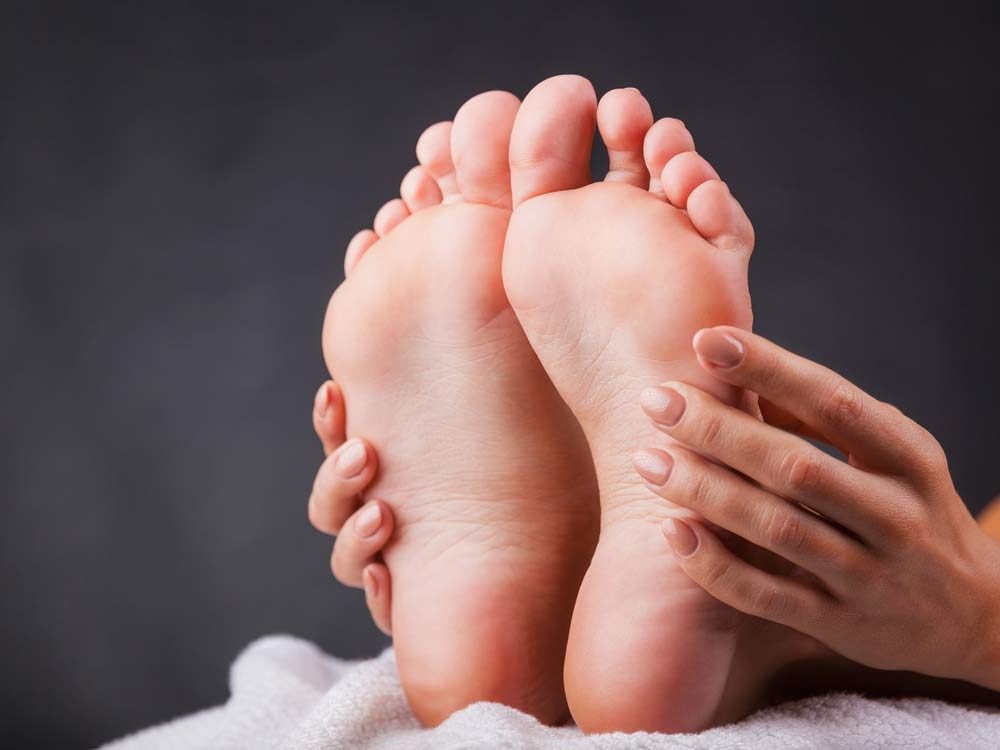
You feel like you have the flu, but you’re not getting better
Fever, chills, muscle aches, and sleepiness are all classic signs of the common flu. But many people don’t realize they’re also lupus symptoms as well, says Delphine Lee, MD, PhD, the former director of the Dirks/Dougherty Laboratory for Cancer Research and Department of Translational Immunology at John Wayne Cancer Institute at Providence Saint John’s Health Center in Santa Monica, California. “The difference between the flu and lupus is that the flu gets better in four to 10 days,” she says, adding that lupus symptoms may last for weeks or months or come and go in cycles.

You’re losing weight (but you’re not on a diet)
Sudden, overnight weight loss may be one of the first signs of lupus. Because lupus is an autoimmune disorder, causing the body’s immune system to attack itself, it can throw your thyroid and hormones out of whack, which in turn affects your weight. Oddly enough, weight gain can also be one of the signs of lupus. Dr. Lee says weight loss is more common, but lupus can also cause water retention, which may manifest as weight gain in some people.
Find out more instances when unexpected weight loss could be a serious problem.

You have tender bumps on your neck
Lymph nodes are small, bean-shaped structures throughout your body that help fight infection and filter out harmful substances. Normally you can’t see or feel them but when they’re working overtime, as in the case of lupus, they can become visibly swollen and painful to touch. (Here are more body parts you didn’t know you had.) The most common place to feel them is along your neck, down your jaw, and behind your ears, but they can also swell in your groin, abdomen, armpits, clavicle, and other places.
“Swollen lymph nodes are occasionally seen as a result of a lupus flare,” says Joan T. Merrill, MD, the medical director of the Lupus Foundation of America and the head of the Clinical Pharmacology Research Program at the Oklahoma Medical Research Foundation Oklahoma City, Oklahoma. Those looking out for lupus symptoms will want to check in on their lymph nodes from time to time.

You get a rash in bright sunlight
A red, butterfly-shaped rash over your nose and cheeks that is triggered by sunlight is one of the more unique symptoms of lupus, Dr. Lee says. At first, it may look like you simply have a flushed face from the heat but unlike a heat rash, a lupus rash may linger long after you’ve left the sun.
Here’s how to tell the difference betweeen six common skin rashes.

“Exhausted” doesn’t even begin to describe how tired you feel
“This isn’t just your everyday tiredness; with lupus, you feel like you literally can’t get out of bed,” Dr. Lee says. Anemia or low red blood cell count is another symptom of lupus that can cause extreme fatigue, according to the Lupus Foundation of America.
Of course, exhaustion can have many causes ranging from depression to mononucleosis, to more. So this symptom on its own isn’t indicative of lupus, but if it’s one of a longer list of lupus symptoms, it’s worth considering.

You have blisters in weird places
A blister on your heel? Call a cobbler. A constellation of blisters inside your nose or mouth? Call a doctor. There are other illnesses that cause painful bumps on your body (such as sexually transmitted infections) but lesions on your mucous membranes are one of the common signs of lupus, Dr. Lee says.
Here are more skin changes you should never ignore.

Your hair is coming out in clumps
While lupus can affect either gender, 90 per cent of all diagnoses are in women between the ages of 15 and 44. And one of the most devastating symptoms of lupus is the loss of your beautiful locks, Lee says. You may notice your hair thinning and losing significant volume over a short period of time.
Find out more sneaky reasons your hair is falling out.

Your hands are freezing, even in the summer
Many people suffer from cold hands and feet, but if your fingers or toes often get extremely cold, turn blue, or feel numb it could be Raynaud’s syndrome. This syndrome is an illness that affects circulation in the extremities and can be a symptom of lupus, Dr. Lee says.

You feel like you’ve got arthritis but you’re only 30
Painful, swollen joints aren’t supposed to be a problem until you’re elderly, right? Not so fast, Dr. Lee says. Unfortunately many young lupus patients experience arthritis-like symptoms in their joints, especially in their legs, with the pain being the worst in the morning and getting better as the day goes on.
These are the best exercises to relieve arthritis pain.

You have chest pain
“Heart attack!” is everyone’s first (panicked) thought when having chest pain. But if your doc clears you for heart disease, lupus symptoms may be the cause. The autoimmune disease can cause swelling throughout the body, including in the sacs surrounding the heart and lungs, causing consistent, dull chest pain, Dr. Lee explains. If it’s your lungs that are primarily affected, you may also experience shortness of breath. Chest pain may be one of the signs of lupus, but it can also be the sign of a lot of other very serious illnesses. If you are experiencing chest pains, see a doctor immediately.
Learn the heart attack symptoms that are frequently misdiagnosed.

You’re having a psychotic break
“Lupus can attack any organ in the body and that includes the brain, sometimes causing psychosis,” Lee says. “Many people come in thinking they’ve suddenly got schizophrenia or are going crazy but in reality, it’s the disease.” Neurological symptoms of lupus can include hallucinations (both visual and auditory), paranoia, confusion, moodiness, and seizures. If you are experiencing these things and have no prior history of mental illness, you may actually be experiencing one of the signs of lupus.
Find out what it’s like to have generalized anxiety disorder.

Your legs are swollen
The kidneys are one of the most common organs to be affected by lupus. “Swelling in the legs can be seen when there is fluid retention due to kidney disease,” Dr. Merrill says.
Learn how to spot the silent signs of kidney cancer.

You have multiple miscarriages
Lupus can cause problems with blood clotting, Lee says, and one of the saddest manifestations of this are repeated miscarriages in women. Getting pregnant isn’t a problem, but staying pregnant can feel impossible. The clotting can also cause your periods to become heavy or irregular. It’s not the most common cause of infertility in women, but if you’re unable to have a baby and have some of these other symptoms, it’s worth getting tested for lupus.
Find out which cancer screenings you really need.

You have lots of random, unexplained symptoms that don’t go away
Often called “the great masquerader,” lupus is a tricky disease as the symptoms of lupus mimic so many other illnesses. “Each person is different in how they’re affected because it depends entirely on which organ is being attacked by the immune system,” Dr. Lee explains. Worse, the disease often comes in “flares,” or periods of time where symptoms are particularly bad, interspersed with long periods where you feel fine, making you wonder if you’re just imagining things.
This means that lupus is often a disease diagnosed only by the process of eliminating all other possible causes, Dr. Lee says—a process which can be extremely frustrating and disheartening for patients as they struggle to find answers. Thankfully there is a simple blood test that looks for anti-nuclear antibodies which can be a good indicator of lupus. Ultimately, however, you have to trust your body, Dr. Lee says. If you feel sick and you’re just not getting better, it’s important to get to the root cause, no matter what that is.
Next, check out 20 symptoms you should never ignore.